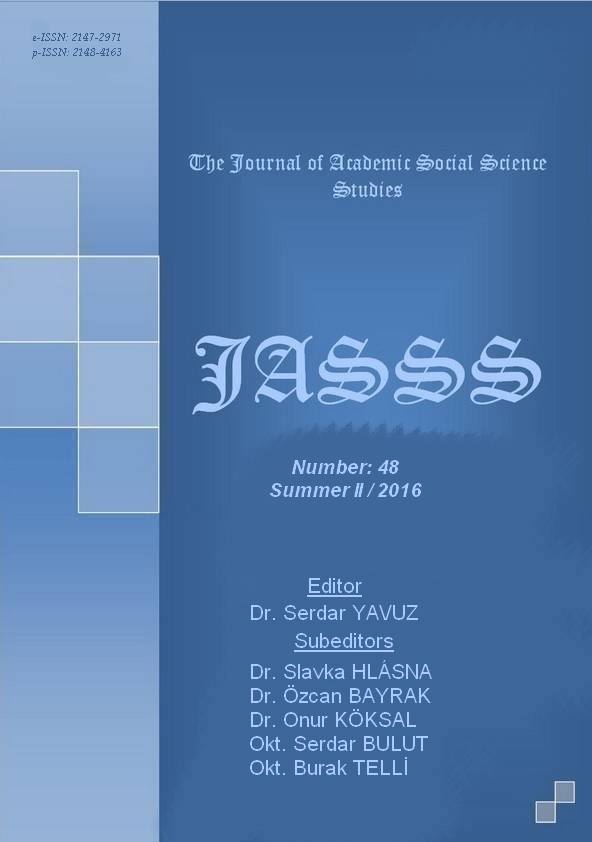ORTAOKUL 6. 7. VE 8. SINIF ÖĞRENCİLERİNİN MATEMATİK DERSİNE YÖNELİK KAYGILARI VE DERSİ DEĞERLENDİRMELERİ
Author :
Abstract
Matematik kaygısı, öğrencilerin matematiksel işlem ve problemlerin çözümünde yaşadıkları zihinsel bozukluk, gerginlik veya tedirgin olma durumudur. Matematik kaygısı bilişsel ve duyuşsal öğeleri içerdiğinden öğrencinin kaygı ile mücadele etme gücüne göre bu durumda verdiği tepki, performansını ve matematik öğrenmesini etkileyecektir. Öğrenci kaygı ile baş edebilirse problemlerin üstesinden gelebilir, aksi takdirde kaygıyı kontrol edebilme yeterliğine sahip değilse performansı azalabilir. Literatürde matematik kaygısı öğrenci öğrenmesinde bir engel olarak görüldüğünden bunların tespit edilmesi ve giderilmeye çalışılması gerekmektedir. Bu doğrultuda çalışmanın amacı ortaokul 6., 7. ve 8. sınıf öğrencilerinin matematik dersine yönelik kaygıları ve kendi görüşlerine göre dersi değerlendirmelerini incelemektir. Nitel araştırma yöntemlerinden durum çalışması olarak tasarlanan araştırmada çalışma grubunu 6. sınıf 36 öğrenci, 7. sınıf 19 öğrenci ve 8. sınıf 17 öğrenci olmak üzere toplam 72 öğrenci oluşturmaktadır. Öğrencilerin matematik dersine yönelik kaygılarını ve dersi değerlendirmelerini incelemek için 10 açık uçlu sorudan oluşan bir görüş formu uygulanarak ilk dört soru betimsel analiz ile incelenmiştir. Araştırmanın bulgularına göre; sınıf seviyesi arttıkça matematik kaygı düzeyinin arttığı gözlenmiştir. Özellikle 7. ve 8. sınıf öğrencileri kavramların zorlaşmasıyla 6. sınıf öğrencilerine göre daha fazla matematik kaygısı yaşamaktadır. 6. sınıf öğrencileri matematik dersinde dersi anlama durumuna göre kendilerini ifade etmekte ve olumlu veya olumsuz duygular yaşamaktadır. 7. sınıf öğrencileri derste daha çok sorun yaşayarak kaygılanmaktadır. 8. sınıf öğrencileri ise sınav kaygısı nedeniyle derste zorlanarak kötü hissetmekte ve sıkılmaktadır. Bu nedenle öğrencilerin matematik dersine yönelik olumlu deneyim yaşayabilecekleri öğrenme ortamları oluşturularak matematiği sadece ders olarak değil, hayatın içine katarak öğrendikleri kaygılarını yenebilmeleri için fırsatlar sağlanabilir.
Keywords
Abstract
Anxiety of mathematics is a mental disorder or a nervous strain that students experience in solving mathematical operations and problems. Student’s reaction in this position according to their power of struggle will affect his/her performance and and learning of mathematics because mathematical anxiety contains cognitive and affective elements. If students cope with the anxiety, problems can be overcome, otherwise students don’t have the competence to control this barrier, their performance can decrease. In the literature, due to the fact that anxiety of mathematics is seen an obstacle in student learning, it should be found and tried to be resolved. In this context, the aim in the research is to search the anxiety of mathematics of 6th, 7th and 8th grade students and the evaluations according to their own opinions. The study group that is designed case study, qualitative research methods contain 36 students in 6th grade, 19 students in 7th grade and 17 students in 8th grade including 72 students totally. To examine the anxiety and the evaluation about mathematics lesson of students, a form that has 10 open-ended questions is used and the first four questions were analyzed with the descriptive analysis. According to the findings of the study; when class level increases, it is observed that the level of the mathematics anxiety increases. Especially 7th and 8th grade students have more mathematics anxiety than 6th grade students because of more difficult mathematics concepts. 6th grade students express themselves according to the case of understanding lesson and have positive or negative feelings. 7th grade students have more problems by experiencing in the lesson and so they have anxiety. Also 8th grade students are bored and have some difficulties in the lesson due to the anxiety of exams. Therefore, it may be focused on creating a learning environment that students have positive experience, they can live mathematics in the real life not only be provided a lesson and the opportunities may be provided to overcome from anxiety.





